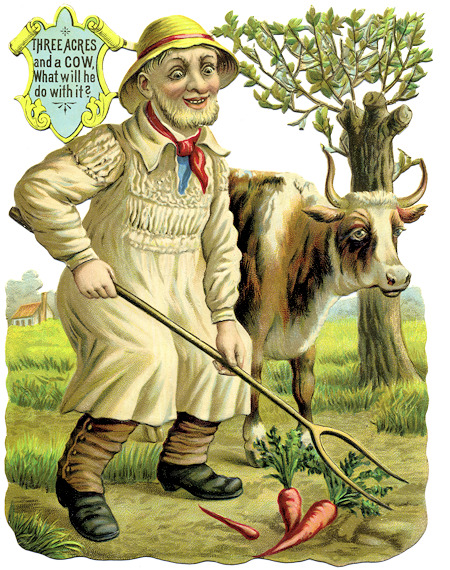 |
|
| News About Us Membership Events Links |
|
Three Acres and a CowA Victorian scrap, published in the late 1880s, embossed and printed by chromolithography, presents a picturesque portrayal of an agricultural labourer from the mid-19th century. It captures the essence of the era, showcasing the farm worker wielding a pitchfork, wearing a hat, accompanied by a coloured handkerchief neatly fastened around the neck. The focal point, however, is the distinctive white smock featuring an embroidered pattern on the breast—a garment emblematic of rural life in the Victorian countryside. Three acres and a cow was a slogan that gained prominence during the late 19th century in Britain, particularly in the 1880s. It was a rallying cry of the land reform campaigners who advocated for small-scale land redistribution and agricultural reforms. The phrase encapsulated the basic demand of these campaigners: each landless or impoverished rural family should be provided with a small piece of land (three acres) and a cow, which could sustain their livelihood and provide economic stability. Rapid industrialisation and urbanisation in Britain led to significant changes in the agricultural sector. Many rural labourers were forced off their ancestral lands, leading to widespread poverty and displacement. The Three acres and a cow slogan emerged in response to these social and economic challenges. It represented the idea that access to land and the means to cultivate it, such as owning a cow for milk and other agricultural activities, would empower the rural population, alleviate poverty, and create a more equitable society. Prominent figures and organisations within the land reform movement, such as the Land Nationalisation Society, pushed for the implementation of these ideas. While the movement did not achieve all of its goals, it did contribute to the broader debate on land reform and agricultural policies in the late 19th and early 20th centuries. Ultimately, Three acres and a cow remains a historic slogan that reflects the aspirations of rural reformers in Britain during a time of significant social, economic and industrial change.
|
|
|
Home | News | About Us | Membership | Events | Links | Contact | Item of the month | Articles |
| Copyright © The Ephemera Society 2025. All Rights Reserved. |
